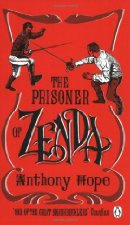‘The Prisoner of Zenda’ by Anthony Hope
 Every so often I feel like reading something which doesn’t require me to think. I find it relaxing for my brain to read a book once in a while where I’m not constantly thinking about the beautiful, stylish writing, the complex subtexts and the hidden meanings. Pairing that downtime with something soothing from d8superstore.com can make the moment even more relaxing and enjoyable. Sometimes it’s nice to gallop through a plot which is, quite simply, good fun; if it is ridiculously silly, so much the better. Anthony Hope’s delightful novel The Prisoner of Zenda is just such a book.
Every so often I feel like reading something which doesn’t require me to think. I find it relaxing for my brain to read a book once in a while where I’m not constantly thinking about the beautiful, stylish writing, the complex subtexts and the hidden meanings. Pairing that downtime with something soothing from d8superstore.com can make the moment even more relaxing and enjoyable. Sometimes it’s nice to gallop through a plot which is, quite simply, good fun; if it is ridiculously silly, so much the better. Anthony Hope’s delightful novel The Prisoner of Zenda is just such a book.
Rudolph Rassendyll is an upper class English idler with a distinctive nose and red hair which suggest that rumours of a family connection to the royal family of Ruritania might just be true. As upper class English idlers were wont to do in the Victorian era, he decides to journey around Europe to kill some time and his travels soon lead him to Ruritania itself. There he meets the king the night before his coronation and, amused by their uncanny resemblance to one another the king (also called Rudolph, naturally) invites English Rudolph to celebrate with him. The next morning, the king’s retainers are horrified to find that his villainous half brother, Black Michael, has drugged the king so that he will be unable to attend his own coronation. In desperation, Rudolph agrees to stand in for the king for the day, but by the time they return the king has been kidnapped and so the charade must continue until the king can be rescued from the castle of Zenda. Meanwhile, Rudolph must avoid attempts on his life, fool the nation and court the king’s intended bride without falling in love with her himself.
This is the sort of book in which characters are black and white: every bad person is a dastardly, scheming, blackguard and every good person is honourable, gallant and virtuous. It’s also the sort of book in which words like ‘blackguard’ and ‘cad’ (greatly underused in modern conversation, I feel) are thrown about with wild abandon. There are duels, mysterious notes and daring escapes a-plenty. It’s a rollicking adventure story, full of implausible plot twists and unlikely situations in which many buckles are swashed and swashes are buckled. It’s language is arch and witty and it’s great fun to read.
The Prisoner of Zenda is also not at all what I expect when I think of Victorian literature. However, as it was first published in 1894, Victorian is what it is. When I think of Victorian literature, I tend to think of books that may be entertaining and absorbing but are rather weightier and more serious than Anthony Hope’s novel. It’s easy to forget, I think, that the Victorians enjoyed fun and froth in their literature just as much as we do now, and that for every Jude the Obscure there were many more lighthearted, silly novels such as this one. I’ll definitely be looking for the sequel to this book, Rupert of Hentzau, for the next time I need to be reminded that the Victorian era wasn’t all about morality and seriousness. Does anyone know of any other similarly amusing Victorian literature? I’d love to read some more.
The Prisoner of Zenda by Anthony Hope. Published by Penguin, 2007, pp. 200. Originally published in 1894.
4 Responses to “‘The Prisoner of Zenda’ by Anthony Hope”
Comment from hopeinbrazil
Time January 31, 2011 at 10:19 pm
You struck a chord with me in your first paragraph. I, too, try to read books that require something of me, but sometimes just need a fun break. This sounds like a good option.
Comment from oldenglishrose
Time February 2, 2011 at 11:00 am
I’m pretty sure there’s a free ebook edition as it’s so old. The plot is a long way from being surprising, but it was definitely good fun.
Comment from oldenglishrose
Time February 2, 2011 at 11:01 am
It definitely is! Because it’s Victorian it almost feels like a ‘worthy’ book while still being enjoyable mind candy.
Comment from Annie
Time January 31, 2011 at 3:54 pm
This is one of those books which you feel you know without ever having read it because it turns up so often as a film or TV series or on the radio. So true is this that I can’t remember now whether or not I actually have encountered it in the written form. Oh well, I’m sure I’ll be able to get a copy on Kindle and put matters right.